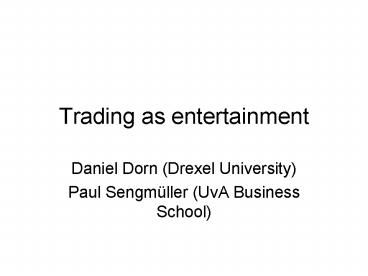Trading as entertainment
1 / 20
Title:
Trading as entertainment
Description:
Can entertainment motives help explain variation in trading activity across people? ... Entertainment attributes are spuriously correlated with an unobserved variable ... – PowerPoint PPT presentation
Number of Views:84
Avg rating:3.0/5.0
Title: Trading as entertainment
1
Trading as entertainment
- Daniel Dorn (Drexel University)
- Paul Sengmüller (UvA Business School)
2
Research questions
- Can entertainment motives help explain variation
in trading activity across people? - What is the magnitude of entertainment-motivated
trading?
3
Why do people tradeindividual stocks?
- Savings and dissavings? But Why trade
individual stocks? Why trade aggressively to
begin with? - Risk sharing? But investments in the familiar
- Speculation? But No-trade theorems?
Individuals are not very good at it
4
Trading as entertainment
- Previous explanations for why people trade rest
on perceived pecuniary benefits of trading - Black (1986, JF) and Shiller (2000) ? Trading
as gambling? Trading as a by-product of a hobby
(following the financial markets)
5
Trading and trader data
- Complete transaction history for a random sample
of 21,000 clients at a German discount broker,
1/1995-5/2000? individual stocks, bonds, mutual
funds, options - Survey responses for a sub-sample of 1,300
clients, 7/2000? objective attributes ?
subjective attributes
6
Entertainment questions
- I enjoy investing. (Es macht mir Spaß, mich mit
Geldanlagen zu befassen.) - I enjoy risky propositions. (Ich habe Spaß an
riskanten Unternehmungen.") - Games are only fun when money is involved.
(Spiele machen erst dann richtig Spaß, wenn es
um Geld geht.) - In gambling, the fascination increases with the
size of the bet. (Bei Glücksspielen steigt die
Faszination mit dem Wetteinsatz.")
(Respondents indicate their agreement with each
statement on a five-point Likert scale)
7
Normal vs excess turnover
- Normal turnover can be rationalized by savings,
liquidity, or rebalancing motives(similar to
Barber/Odean) - Excess turnover is the remainder
8
Normal vs excess turnover
9
Hypotheses
- Investors who enjoy investing will trade more.
- Investors who enjoy gambling will trade more.
- Differences in trading activity between
entertainment-driven traders and others shows up
as excess, not normal, turnover.
10
People who enjoy investingtrade more
excessively
11
People who enjoy risky propositionstrade more
excessively
12
Multi-variate setting
- Similar results when we control for
- Gender ()
- Age (-)
- Educational attainment
- Self-employment ()
- Income
- Wealth (-)
13
Alternative explanations
- Unimportant accounts drive results.
- There is an omitted variable linked to survey
participation. - Portfolio returns lead trading activity. People
enjoy investing or gambling more after periods of
high returns. - Overconfident investors trade more.
Overconfident investors enjoy investing more.
14
Unimportant accounts?
- Perhaps people who enjoy investing/gambling have
more accounts elsewhere, e.g., full-service
accounts - Overall, their trading activity may be similar to
those of their peers, but they trade more in
discount accounts
15
Unimportant accounts cannot explain the results
All accounts
Only important accounts
16
Non-response bias
- Entertainment attributes are spuriously
correlated with an unobserved variable that
drives both survey participation and trading
activity - Second stage of Heckman two-stage selection model
returns similar results
17
Portfolio returns before the survey before
trading commissions
18
Overconfidence
- Infer overconfidence from agreement with
- I'm much better informed than the average
investor. - My past investment successes were, above all,
due to my specific skills. - I control and am fully responsible for the
results of my investment decisions.
19
Overconfidence
- Only agreement with 1. better than average is
positively correlated with trading activity (see
also Glaser and Weber) - Inclusion of overconfidence attributes does not
affect coefficients of entertainment attributes
in multivariate regression
20
Conclusion
- Entertainment motives appear to be important
drivers of variation in trading activity across
people - Trading may be hazardous to your wealth, but
welfare implications are not that obvious - Does the availability of entertainment
alternatives affect noise trader activity?









![[DOWNLOAD]⚡️PDF✔️ Hourly Billing Is Nuts: Essays On The Insanity Of Trading Time For Money K PowerPoint PPT Presentation](https://s3.amazonaws.com/images.powershow.com/10098918.th0.jpg?_=202408140712)
![[READ] Hourly Billing Is Nuts: Essays On The Insanity Of Trading Time For Money Kindle E PowerPoint PPT Presentation](https://s3.amazonaws.com/images.powershow.com/10099649.th0.jpg?_=20240815072)




















